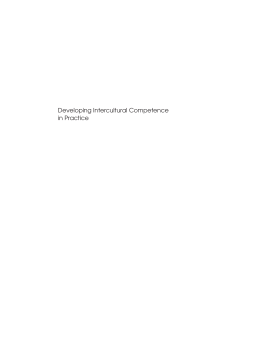
BOOK
Developing Intercultural Competence in Practice
Prof. Michael Byram | Adam Nichols | Dr. David Stevens
(2001)
Additional Information
Book Details
Abstract
It is now widely recognised that learning a language should not just involve linguistic competence but also intercultural competence. It is also clear that intercultural competence can be developed through related subjects such as geography, history, mother tongue teaching. This book takes this as a given and provides practical help for teachers who wish to help their learners acquire intercultural competence in the ordinary classroom. It contains descriptions of lessons and materials from a wide range of classrooms in several countries and for beginners to advanced learners.
Michael Byram, Adam Nichols and David Stevens are in teacher education at the University of Durham. They specialise in the teaching of foreign languages (Byram), geography (Nichols) and English as mother tongue (Stevens) and have found a common interest in the ways in which all these subjects involve cultural issues. They have invited authors from throughout Europe and North America to describe their work in the classroom or in producing teaching materials to develop intercultural competence.
Table of Contents
| Section Title | Page | Action | Price |
|---|---|---|---|
| Contents | v | ||
| Foreword | vii | ||
| Introduction | 1 | ||
| Part 1 In the Classroom | 9 | ||
| Chapter 1 The International Partnership Project | 11 | ||
| Chapter 2 Teaching Intercultural Communicative Competence through Literature | 29 | ||
| Chapter 3 ‘Up the Hills of Identity’ | 44 | ||
| Chapter 4 Visual Codes and Modes of Presentation of Television News Broadcasts | 60 | ||
| Chapter 5 An Approach to Implementing a Cultural Studies Syllabus | 77 | ||
| Chapter 6 ‘Family Life’ and ‘Regional Identity’: Comparative Studies While Learning French | 93 | ||
| Chapter 7 ‘It Must Be Cultural Because I Don’t Do It’: Cultural Awareness in Initial TESOL Teacher Education | 111 | ||
| Part 2 Beyond the Classroom | 131 | ||
| Chapter 8 Virtual Intercultural Competence: A Programme for Japanese Elementary School Students | 133 | ||
| Chapter 9 Students as Virtual Ethnographers: Exploring the Language Culture-Connection | 146 | ||
| Chapter 10 Working in Tandem: An Anglo-French Project | 162 | ||
| Chapter 11 New Tools for Old Tricks: Information and Communication Technology in Teaching British Cultural Studies | 176 | ||
| Chapter 12 Tandem Learning as an Intercultural Activity | 189 | ||
| Chapter 13 ‘Why do Danes put Their Elderly in Nursing Homes?’ – Working Outside the Classroom with Adult Second Language Learners | 203 | ||
| Part 3 Developing Resources | 217 | ||
| Chapter 14 Cultural Understanding in Danish Schools | 219 | ||
| Chapter 15‘ I thought my teacher fancied me’ | 236 | ||
| Chapter 16 British and Bulgarian Christmas Cards: A Research Project for Students | 246 | ||
| Chapter 17 Study of Landscapes as an Approach to Openness to Others | 260 | ||
| Further Reading | 277 | ||
| Index | 282 |
